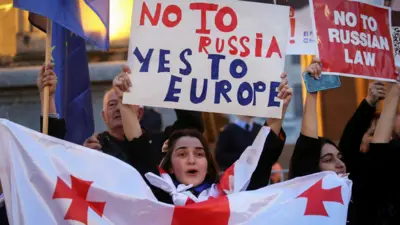We've updated our Privacy and Cookies Policy
We've made some important changes to our Privacy and Cookies Policy and we want you to know what this means for you and your data.
German elections usher in political change with a small 'c'
- By Katya Adler
- Europe editor
Image source, Getty Images
"Two wannabe chancellors" and "Let the poker game begin!" declared a couple of headlines on the widely read Bild newspaper website on Monday morning.
Was this really in reference to a German election? German politics have a reputation for being staid, predictable and even boring.
Not this time.
This was an election night on a knife-edge, with Germany's two main political parties jostling for the lead. At times with only a fraction of a percentage point between them.
Now both the Social Democrats (who look like they've narrowly won the vote) and the conservative CDU/CSU union (who narrowly lost it) have claimed the right to try to form a government
The two rivals are also pursuing the same coalition partners - the Greens and the FDP liberals - so it's likely to be a lengthy, complex process.
- SIMPLE GUIDE: How German election works
- RUNNERS AND RIDERS: Rivals to lead Germany after Merkel
- MERKEL'S LEGACY: How Germans will remember Merkel
And in the meantime, there'll be no Auf Wiedersehen to Angela Merkel. She'll remain Germany's caretaker chancellor. Those retirement plans of hers are now expected to be put on ice until around Christmas.
So far, so politically messy and un-German.
Or is it?
In the lead-up to these elections there was an incredible amount of talk about how Germany would now change, perhaps dramatically, after 16 years of Chancellor Merkel.
Yet during the election campaign the respective leaders of the conservative and the Social Democrat parties each tried to present themselves as continuity candidates. Not wildly different, but recognisably similar to Mrs Merkel in many ways.
Germans talk about change, but most yearn for stability.
None of the parties hoping to form a new coalition government can be described as radical.
Image source, Getty Images
What we're probably looking at after these elections is limited change. Let's call it change with a small "c".
The real change I see in Germany is that it is now more like other European countries when it comes to voting patterns.
People expect to be won over by candidates. They no longer automatically gave their vote to a party out of "loyalty", because that's always how they or their family voted.
Angela Merkel's conservatives ran the risk of losing voters as soon as she announced plans to retire. The majority of CDU supporters in the last two elections were women. Others who normally shunned Mrs Merkel's party also said they lent it their vote solely because of her.
Those supporters were ripe for picking by other parties.
The political research company Infratest Dimap suggests the CDU/CSU union lost more than two million votes in this election to the Greens and the Social Democrats.
The poker game now being played between political rivals to form Germany's new government will be watched with interest abroad as well as at home.
Germany is the EU's richest and most powerful country. Its big role on the world stage won't suddenly shrink because of Angela Merkel's departure. Or because voting patterns have suddenly become more splintered.
Germany's allies and trade partners value its political stability. Change with a small "c" won't unseat that.
Merkel legacy: EU's queen with a tarnished crown
Germany's outgoing leader has steered the EU through several crises but her European legacy is mixed.
Top Stories
Features & Analysis
Most read
Content is not available








